
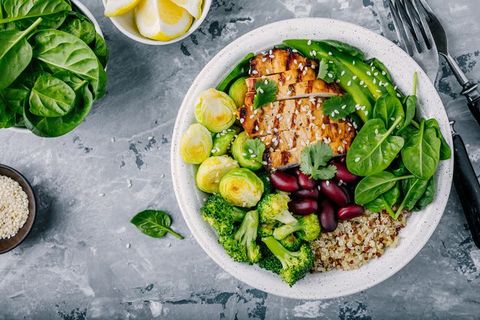
I’m not sure when I decided to make the leap, and I didn’t think the decision was all that crazy at the time.
I’d always been a skinny guy, hovering around 145 pounds throughout high school and college. I ate and drank like crap back then, but my inferno of a metabolism quickly incinerated the Pringles BBQ chips, Yoo-hoo, and Keystone Lights I used to throw into my gullet.
After college, though, my high-performance, fat-burning furnace began to sputter and required additional maintenance. At one point, people started telling me I had “filled out.”
This was around the time when the Paleo diet was first unearthed, but for some reason I couldn’t find the appeal of living a life devoid of cheese, oatmeal, and peanut butter. Plus, didn’t the cavemen from that era lead short, dysentery-filled lives?
Atkins was also a thing. So was The South Beach Diet. The Duchess of York was hawking Weight Watchers for some reason (money?). Yet everyone I knew on these “systems” seemed to like talking about their diet more than they actually liked being on the diet itself.
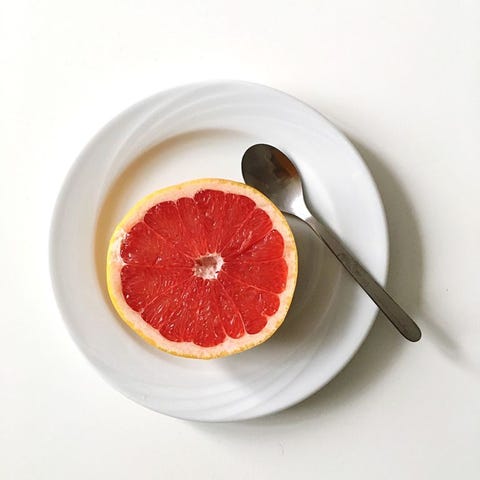
Getty ImagesEsra Karakose / EyeEm
I don’t think it’s a coincidence that at the heart of the word “diet” is the word “die,” which is what most trend diets make you want to do when you’re in the third week of not eating cheese, oatmeal, and peanut butter, despite your new pants size.
And, at least what I could tell through observation, those diets only seemed to work in the short term. Maybe I should have been a weight-loss scientist, because a 2017 study reviewed the results of 25 weight loss programs and found that “commercial weight-loss programs frequently fail to produce modest but clinically meaningful weight loss with high rates of attrition suggesting that many consumers find dietary changes required by these programs unsustainable.”
So I did something else. I decided to collect all the advice I’d read from the vast body of scientific research and dietitians I’d talked to as Food & Nutrition Editor of Men’s Health magazine and try to eat a sensible diet. Here’s what happened.
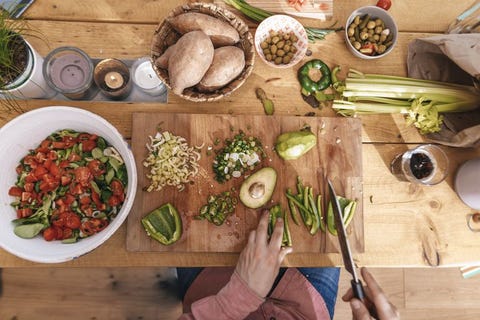
Getty ImagesWestend61
How I Ate a Sensible Diet
First off, I decided to eat real food. I prioritized anything that had one ingredient: chicken, beef, salmon, romaine lettuce, tomatoes, peanuts, milk, lobster, eggs, butter, avocado, blueberries, and I think you get the point. Did I occasionally enjoy a processed food product that contained something weirdo-sounding like guar gum or carrageenan? Sure. But I made no-bullshit food the centerpiece of each of my meals. Which segues nicely into my next point…
I made no food evil. Trendy diets love demonizing entire food groups or nutrients. On a low-fat diet you have to eat shit like Snackwells because god forbid you actually enjoy a real cookie. On Keto, carbs are so bad they’ll beat up a nice old grandmother crossing the street. On Dave Asprey’s bonkers Bulletproof Diet you’d better only buy his special brand of coffee because a study he sort of read from 1832 says that mycotoxins in commercial coffee will turn you into a half-man, half-bat with one sole purpose: to consume every last one of those you love.
By telling people what they can’t have on a diet, I think that makes them want them more. If I told you I had a brand-new diet called The Cotton Candy Diet, where you could eat anything in the world except for cotton candy, what does that make you want to do? You want to find the nearest carnival barker and load up on some of that oh-so-sweet pink fluffy spun sugar, don’t you now?
So I eat cookies. I eat carbs. I even drink coffee supposedly loaded with mycotoxins AND ALL MY LOVED ONES ARE STILL STANDING, DAVE ASPREY.
Lastly, I ate fruits and vegetables with every meal and cut back on booze and desserts. This is not hard. I have two clementines or a banana or a split broiled tomato for breakfast. I eat a big salad of mixed greens or a side of coleslaw or a ripe, juicy pear for lunch. For dinner I’ll saute a mess of spinach (olive oil, garlic, pan on medium heat, salt and pepper, done) or grate a quick carrot side salad or dice and roast some sweet potatoes. I do this while I’m cooking my proteins.
I try to shoot for 30 grams of protein at each meal, which I just eyeball (that’s about a palm-sized piece of chicken, fish, whatever) and a fiber-rich side (kale, whole grains, blah blah blah).
And then I either choose to have a beer with or after dinner or a simple dessert, like a slice of pie or a piece of dark chocolate. If I’m not craving something sweet, I’ll have a cup of tea. Yeah. Tea.
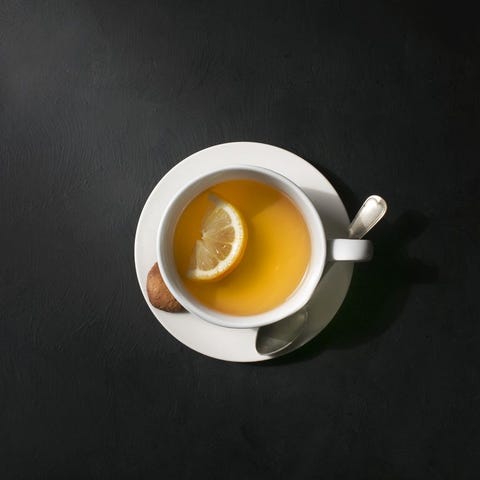
Getty Imagestwomeows
My Biggest Challenges
The holidays. Parties with buffet tables set up. Red Lobster’s Endless Shrimp. But you know what? I see these things for what they are: off-seasons within a yearlong perspective of healthy eating. Diet’s like Whole30 put god-awful endpoints, stages, or “phases” to eating plans, which grow ever-more restrictive with the passage of time. They argue these draw-dawn periods help the dieter acclimate to change. To me, this is the equivalent of gradually turning thumb screws tighter. Why take the fun out of eating?
My Biggest Successes on a Sensible Diet
I’ve maintained a healthy weight of 155, give or take five pounds, ever since reaching a max of 170 post-college. I haven’t incurred any terminal diseases. I have boundless energy for my wife and kid. I’m happy. I like food. I don’t have to bore people or madden restaurant servers with an endless list of things I “can’t” eat. I don’t have to go to a health food store because those places smell weird. I don’t have to count points because that sounds terrible and I’m bad at math. I don’t have to give Dave Asprey any more money. I don’t have to feel guilty. And did I mention I like food?
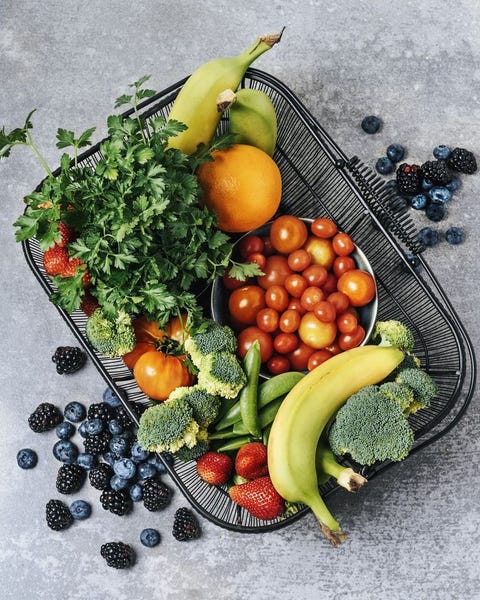
Getty ImagesClaudia Totir
My Lifelong Lessons from a Sensible Diet
Eating should be enjoyable. Not temporarily enjoyable in the I-had-a-stressful-day-so-I’m-going-to-pound-this-five-dollar-hot-and-ready-Little-Ceasar-pizza-in-my-car-in-the-parking-lot enjoyable. I’m talking about the kind of enjoyable where you don’t feel shame because you maxed out your Weight Watchers points for the day or accidentally ate a spoonful of non-Paleo peanut butter or didn’t put Dave Asprey’s fucking Brain Octane oil on your sushi roll (https://www.youtube.com/watch?v=ql2trIZMJS0).
Here’s my main takeaway from 10 years of eating sensibly: If the plan you have for what you feed yourself causes you more stress and adds more work to your already-busy life, you’re not eating well. If you’re meticulously counting calories, or carbs, or worse yet tiny milligrams of sodium, you’re going to drive yourself crazy, distance yourself from the enjoyment of eating real food, and continuously subject yourself to the downward spiral of yo-yo weight loss and weight gain perpetuated by trendy diets that only really, truly care about one thing: how much money they make off of you.
The best diet isn’t sexy. It doesn’t have celebrity endorsements. There’s no plan you have to buy into. Hell, it doesn’t even have a marketing strategy. The best diet is one that is based on the inclusion of healthful foods—not the exclusion of food groups—and will last you far longer than the lifespan of whatever Atkins, Zone, Whole30, South Beach, low-fat, low-carb, Paleo, Mesozoic, Bulletproof, or keto plan is the hot new thing.
Now, what’s for dinner?
Paul Kita is the Food & Nutrition Editor at Men’s Health. His new cookbook, A Man, A Pan, A Plan has plenty of easy, healthful recipes you can cook, like, right now.
BUY IT HERE
Source: Read Full Article